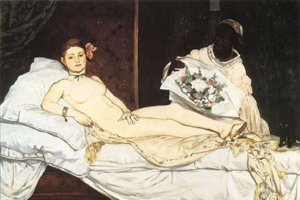the most demystifying of all senses
“In the exhibition halls, the car on show is explored with an intense, amorous studiousness: it is the great tactile phase of discovery, the moment when visual wonder is about to receive the reasoned assault of touch (for touch is the most demystifying of all senses, unlike sight, which is the most magical).”
—Roland Barthes, The New Citroen, from Mythologies, 1957, translated from the French by Jonathan Cape, 1972.
take a black pebble
“Or take a black pebble: I can make it signify in several ways, it is a mere signifier; but if I weigh it with a definite signified (a death sentence, for instance, in an anonymous vote), it will become a sign.”
—Roland Barthes, Myth Today, from Mythologies, 1957, translated from the French by Jonathan Cape, 1972.
Olympia

“It is not hard to see why viewers at the 1865 Salon, where Olympia was first exhibited, resisted so strenuously her thin-lipped invitation. . . .
It is as though Manet, having accepted his friend Baudelaire?s challenge to be a painter of modern, urban life in all its transitory aspects, had decided to throw the challenge right back at the onlooker. Modern life in the industrial era implied fragmentation, dislocation, uncertainty, risk, it was full of ironic and inharmonious details?like the black cat arching its back at the end of Olympia?s bed.”
—Calvin Tomkins, the essay Manet and De Kooning, February 6, 1984. From Post- to Neo-: The Art World of the 1980s, 1988.
Blue Ether
“The lovers were just entering the grounds of the pension. They were leaning toward each other as the water-oaks bent from the sea. There was not a particle of earth beneath their feet. Their heads might have been turned upside-down, so absolutely did they tread upon blue ether.”
—Kate Chopin (1851–1904), The Awakening, 1899.
The white light of the moon
“The white light of the moon had fallen upon the world like the mystery and the softness of sleep.”
—Kate Chopin (1851–1904), The Awakening, 1899.
Pirate gold
“Pirate gold isn’t a thing to be hoarded or utilized. It is something to squander and throw to the four winds, for the fun of seeing the golden specks fly.”
—Kate Chopin (1851–1904), spoken by Edna in The Awakening, 1899.
Miss Mayblunt
“‘Something new, Edna?’ exclaimed Miss Mayblunt, with lorgnette directed toward a magnificent cluster of diamonds that sparkled, that almost sputtered, in Edna’s hair, just over the center of her forehead.
‘Quite new; “brand” new, in fact; a present from my husband. It arrived this morning from New York.’”
—Kate Chopin (1851–1904), from The Awakening, 1899.
the glow
“The golden shimmer of Edna’s satin gown spread in rich folds on either side of her. There was a soft fall of lace encircling her shoulders. It was the color of her skin, without the glow, the myriad living tints that one may sometimes discover in vibrant flesh.”
—Kate Chopin (1851–1904), from The Awakening, 1899.
the million lights of the sun
“The water of the Gulf stretched out before her, gleaming with the million lights of the sun.”
—Kate Chopin (1851–1904), from The Awakening, 1899.
ardent kisses
“What embraces, in which the lilacs were crushed between them! What ardent kisses! What pink flushes of happiness mounting the cheeks of the two women.”
—Kate Chopin (1851–1904), Lilacs, from The Awakening and Selected Stories, 1984.